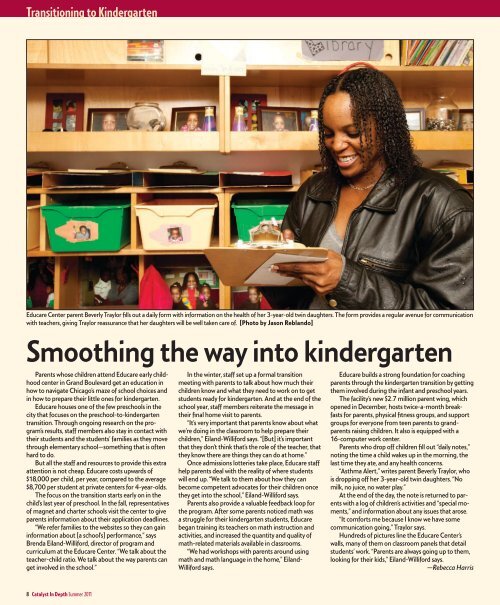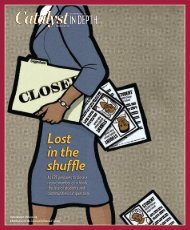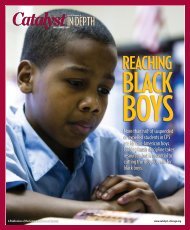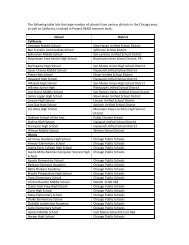The ABCs of kindergarten - catalyst-chicago.org
The ABCs of kindergarten - catalyst-chicago.org
The ABCs of kindergarten - catalyst-chicago.org
Create successful ePaper yourself
Turn your PDF publications into a flip-book with our unique Google optimized e-Paper software.
Transitioning to Kindergarten<br />
Educare Center parent Beverly Traylor fills out a daily form with information on the health <strong>of</strong> her 3-year-old twin daughters. <strong>The</strong> form provides a regular avenue for communication<br />
with teachers, giving Traylor reassurance that her daughters will be well taken care <strong>of</strong>. [Photo by Jason Reblando]<br />
Smoothing the way into <strong>kindergarten</strong><br />
Parents whose children attend Educare early childhood<br />
center in Grand Boulevard get an education in<br />
how to navigate Chicago’s maze <strong>of</strong> school choices and<br />
in how to prepare their little ones for <strong>kindergarten</strong>.<br />
Educare houses one <strong>of</strong> the few preschools in the<br />
city that focuses on the preschool-to-<strong>kindergarten</strong><br />
transition. Through ongoing research on the program’s<br />
results, staff members also stay in contact with<br />
their students and the students’ families as they move<br />
through elementary school—something that is <strong>of</strong>ten<br />
hard to do.<br />
But all the staff and resources to provide this extra<br />
attention is not cheap. Educare costs upwards <strong>of</strong><br />
$18,000 per child, per year, compared to the average<br />
$8,700 per student at private centers for 4-year-olds.<br />
<strong>The</strong> focus on the transition starts early on in the<br />
child’s last year <strong>of</strong> preschool. In the fall, representatives<br />
<strong>of</strong> magnet and charter schools visit the center to give<br />
parents information about their application deadlines.<br />
“We refer families to the websites so they can gain<br />
information about [a school’s] performance,” says<br />
Brenda Eiland-Williford, director <strong>of</strong> program and<br />
curriculum at the Educare Center. “We talk about the<br />
teacher-child ratio. We talk about the way parents can<br />
get involved in the school.”<br />
In the winter, staff set up a formal transition<br />
meeting with parents to talk about how much their<br />
children know and what they need to work on to get<br />
students ready for <strong>kindergarten</strong>. And at the end <strong>of</strong> the<br />
school year, staff members reiterate the message in<br />
their final home visit to parents.<br />
“It’s very important that parents know about what<br />
we’re doing in the classroom to help prepare their<br />
children,” Eiland-Williford says. “[But] it’s important<br />
that they don’t think that’s the role <strong>of</strong> the teacher, that<br />
they know there are things they can do at home.”<br />
Once admissions lotteries take place, Educare staff<br />
help parents deal with the reality <strong>of</strong> where students<br />
will end up. “We talk to them about how they can<br />
become competent advocates for their children once<br />
they get into the school,” Eiland-Williford says.<br />
Parents also provide a valuable feedback loop for<br />
the program. After some parents noticed math was<br />
a struggle for their <strong>kindergarten</strong> students, Educare<br />
began training its teachers on math instruction and<br />
activities, and increased the quantity and quality <strong>of</strong><br />
math-related materials available in classrooms.<br />
“We had workshops with parents around using<br />
math and math language in the home,” Eiland-<br />
Williford says.<br />
Educare builds a strong foundation for coaching<br />
parents through the <strong>kindergarten</strong> transition by getting<br />
them involved during the infant and preschool years.<br />
<strong>The</strong> facility’s new $2.7 million parent wing, which<br />
opened in December, hosts twice-a-month breakfasts<br />
for parents, physical fitness groups, and support<br />
groups for everyone from teen parents to grandparents<br />
raising children. It also is equipped with a<br />
16-computer work center.<br />
Parents who drop <strong>of</strong>f children fill out “daily notes,”<br />
noting the time a child wakes up in the morning, the<br />
last time they ate, and any health concerns.<br />
“Asthma Alert,” writes parent Beverly Traylor, who<br />
is dropping <strong>of</strong>f her 3-year-old twin daughters. “No<br />
milk, no juice, no water play.”<br />
At the end <strong>of</strong> the day, the note is returned to parents<br />
with a log <strong>of</strong> children’s activities and “special moments,”<br />
and information about any issues that arose.<br />
“It comforts me because I know we have some<br />
communication going,” Traylor says.<br />
Hundreds <strong>of</strong> pictures line the Educare Center’s<br />
walls, many <strong>of</strong> them on classroom panels that detail<br />
students’ work. “Parents are always going up to them,<br />
looking for their kids,” Eiland-Williford says.<br />
—Rebecca Harris<br />
8 Catalyst In Depth Summer 2011









